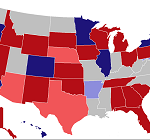Statement:
“The results of the mid-term elections in the U.S. provide insight on how negatively President Obama and his administration are perceived by the electorate. The Republicans have consolidated their majority in the House, previously dominated by the Democrats, by gaining 14 seats. In the Senate, the Republicans have gained 7 seats in Arkansas, South Dakota, Montana, Colorado, Iowa, North Carolina and West Virginia. Additionally, there are now 31 Republican governors in State Houses, versus only 15 Democrats.
Traditionally, the Senate has been influential in foreign policy decision-making, and the advantage that Republicans have gained in the mid-term elections will reflect in the U.S.’ foreign policy going forward. This may not be good news for countries like Iran, Syria and Russia, where a Congress dominated by Republicans is likely to take a harder stance. It is, however, a positive development for Israel – Jewish-American organisations have had close relations with individual members of the Senate and House, and bilateral relations between the two countries are likely to be less fractious.
While India has enjoyed bipartisan support in the U.S, neither the Democrats nor Republicans have championed the relationship. The bilateral is not likely to see significant changes, and disagreements around issues such as intellectual property rights, particularly in the pharmaceutical industry, and H1B1 visas will persist.”
For more information or interview requests, please contact Reetika Joshi at joshi.reetika@gatewayhouse.in.


